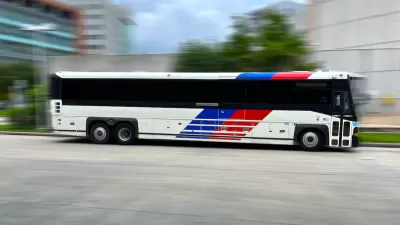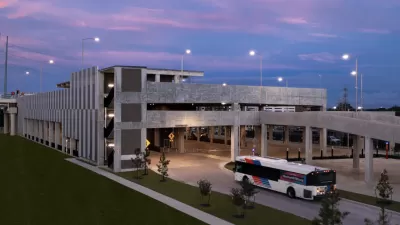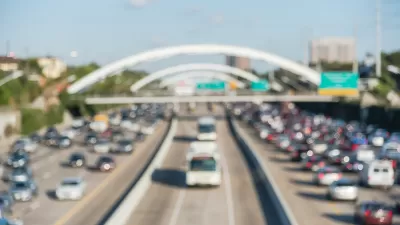To ease community concerns, the agency is proposing an underpass in lieu of a prior plan that would have elevated a new rapid transit line above a portion of its downtown route.

After backlash from community groups, Houston’s Metropolitan Transportation Authority (Metro) announced it would nix plans to build an overpass for the University Corridor bus rapid transit (BRT) route, opting instead for an underpass that “would allow buses, and emergency vehicles if necessary, to drive below the Union Pacific Railroad tracks, which are another source of frustration for the East End community. A pedestrian and bicycle path also would flow under the tracks, while automobile drivers still would cross the tracks at ground level.”
Dug Begley describes the changes in the Houston Chronicle, whose editorial board has called the University Corridor line a “crucial project.” The underpass option would give buses a dedicated lane and let them avoid delays at the train crossing without requiring extra space. “Officials believe they can control flooding, based on the most current county flood maps, by installing flood gates Metro can manage.”
As Begley explains, “The decision to ditch the planned overpass at Lockwood and Harrisburg, following weeks of discussion and at the urging of local elected officials, clears Metro to approve its preferred route for the University Corridor, the 25.3-mile backbone of planned bus rapid transit in the region.”
Begley notes that it remains unclear whether the changes will appease critics of the project. “Skeptics of Metro’s $7.5 billion long-range plan, approved by voters in 2019, note that the Silver Line buses, predicted to carry thousands of shoppers in workers in The Galleria area, snake mostly empty along the street because of changes in commuting patterns following the COVID pandemic that has meant fewer commuters coming into the area five days a week.”
FULL STORY: Metro pitches underpass to ease East End concerns about University Corridor BRT route. Is it enough?

Trump Administration Could Effectively End Housing Voucher Program
Federal officials are eyeing major cuts to the Section 8 program that helps millions of low-income households pay rent.

Planetizen Federal Action Tracker
A weekly monitor of how Trump’s orders and actions are impacting planners and planning in America.

Ken Jennings Launches Transit Web Series
The Jeopardy champ wants you to ride public transit.

Rebuilding Smarter: How LA County Is Guiding Fire-Ravaged Communities Toward Resilience
Los Angeles County is leading a coordinated effort to help fire-impacted communities rebuild with resilience by providing recovery resources, promoting fire-wise design, and aligning reconstruction with broader sustainability and climate goals.

When Borders Blur: Regional Collaboration in Action
As regional challenges outgrow city boundaries, “When Borders Blur” explores how cross-jurisdictional collaboration can drive smarter, more resilient urban planning, sharing real-world lessons from thriving partnerships across North America.

Philadelphia Is Expanding its Network of Roundabouts
Roundabouts are widely shown to decrease traffic speed, reduce congestion, and improve efficiency.
Urban Design for Planners 1: Software Tools
This six-course series explores essential urban design concepts using open source software and equips planners with the tools they need to participate fully in the urban design process.
Planning for Universal Design
Learn the tools for implementing Universal Design in planning regulations.
Ada County Highway District
Clanton & Associates, Inc.
Jessamine County Fiscal Court
Institute for Housing and Urban Development Studies (IHS)
City of Grandview
Harvard GSD Executive Education
Toledo-Lucas County Plan Commissions
Salt Lake City
NYU Wagner Graduate School of Public Service





























